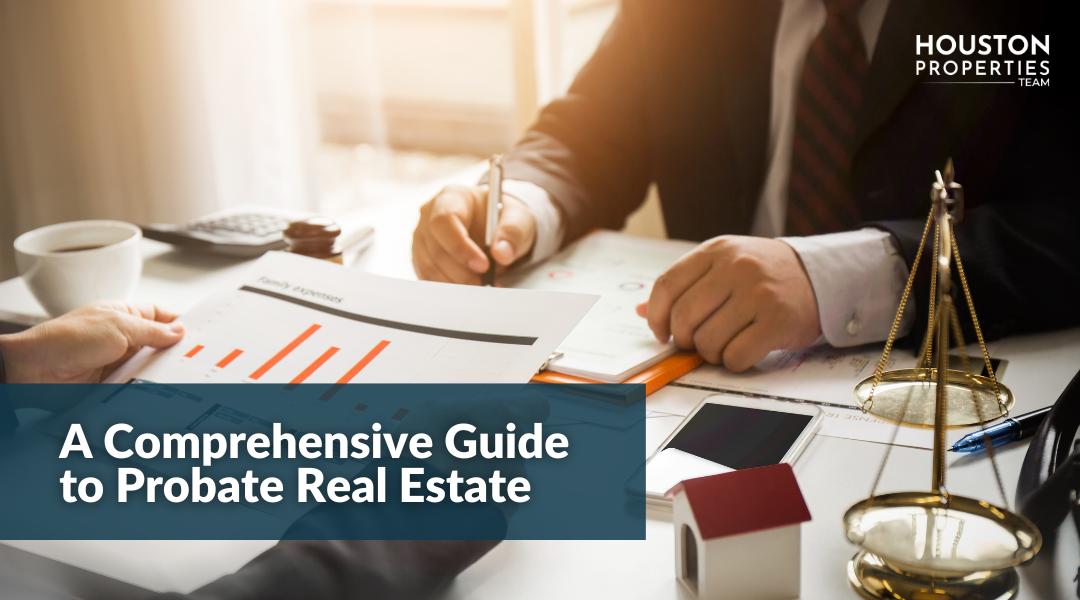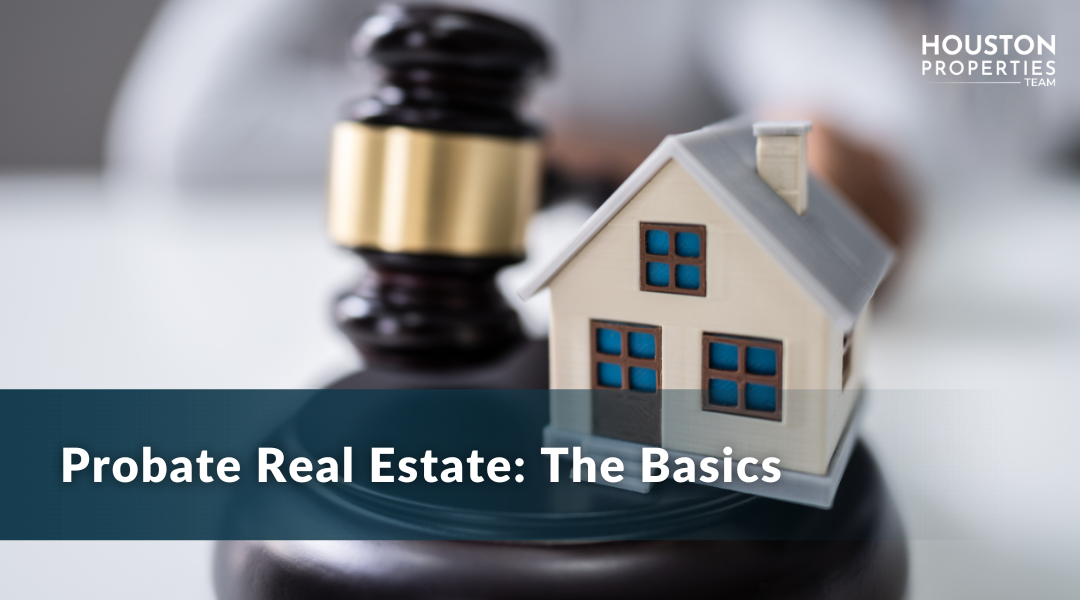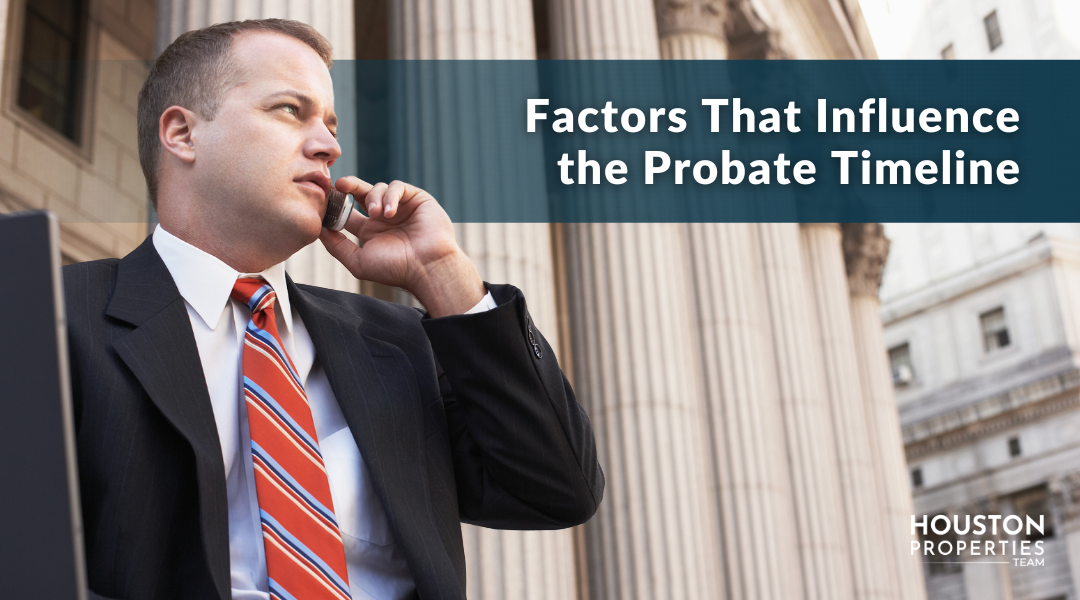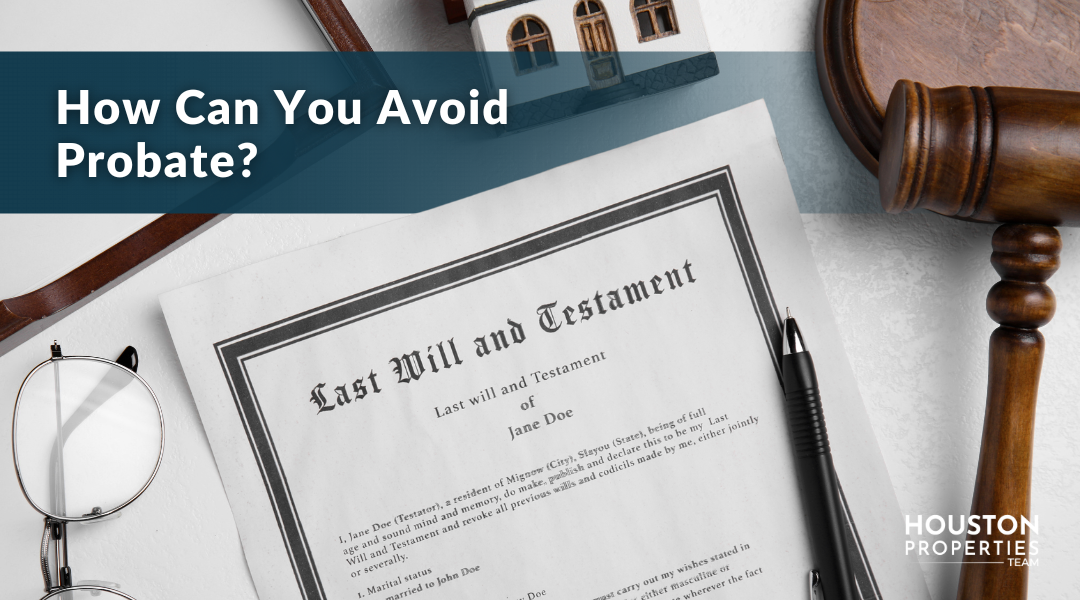What Is Probate Real Estate And How Does It Work? A Complete Guide
Learn how probate in real estate works for buyers and sellers.

Every year, an estimated 1.3 million properties pass through probate, and Americans spend roughly $2 billion on probate costs alone. But what is probate in real estate and how does it work exactly?
We'll answer that here, in your one-stop resource for all things related to probate in real estate. Whether you're an executor, a seasoned investor, or simply someone intrigued by the intricacies of estate and property law, we've got you covered. Our goal is to demystify the probate process for you, step by step. We'll delve into the very definition of probate for real estate, and you'll learn how to navigate probate, how to buy probate real estate properties, and even how to sell them if you find yourself on the other side of the equation.
But that's not all. We'll also discuss factors that influence how long probate will take, potential ways to avoid it, and the pros and cons of investing in probate real estate. Let's get started.
"I highly recommend the Houston Properties team for anyone in need of a knowledgeable and professional realtor in the Houston area. The team at Houston Properties is dedicated to finding their clients the perfect home or property, and they go above and beyond to ensure a smooth and successful transaction. With their extensive knowledge of the Houston real estate market and their commitment to excellent customer service, the Houston Properties team is the go-to choice for anyone looking to buy or sell a home in the Houston area." - Jesse Manley
Table of Contents
- What is Probate in Real Estate?
- Steps in the Probate Real Estate Process
- How Long Does Probate Take?
- Ways to Avoid Probate
- Pros and Cons of Investing in Probate Real Estate
- How to Buy Probate Real Estate Property
- How to Sell Probate Real Estate Property
- FAQ
- The Best Houston Realtor to Help You Buy or Sell Probate Real Estate Property
What is Probate in Real Estate?

"Paige Martin is a trustworthy realtor. She is the top producing agent in Houston, and it's easy to see why after working with her and the Houston Properties Team. She has the ability to make things easy for her clients. Paige helped us make smart decisions, avoid stress, and complete our home buying transaction with the least amount of issues." - Selma Gilda
Probate is the legal procedure by which the assets of a deceased person (often known as a decedent) are distributed to their heirs or beneficiaries and any outstanding debts are settled.
A probate attorney often guides this process, while the probate court supervises it. The executor, named in the decedent's will or appointed by the court, plays a central role in managing the decedent’s estate. Executor responsibilities include tasks like validating the will, appraising assets, settling debts and taxes, and ultimately ensuring the proper distribution of real estate and other assets according to the decedent's wishes or applicable state laws.
When is probate required?
Probate is typically required in the following scenarios:
When a person passes away without a valid will (creating a legal condition called intestacy), the state's intestate succession laws dictate how their real estate and other assets will be distributed.
Disputes among heirs or beneficiaries regarding the validity of the will or its terms can lead to real estate probate.
Large or intricate estates with multiple real properties or significant debts may also require probate to ensure fair and lawful distribution.
Who owns a house during probate?
During probate, the house remains part of the deceased person's estate initially, with control vested in the executor or personal representative. Ownership is subsequently transferred to the designated beneficiaries or heirs once the probate process is complete. The specifics of ownership and any potential sale are dictated by the decedent's will or state laws, ensuring a legal and orderly transfer of property rights.
Can you live in a house during probate?
Living in a house during probate is possible but it often relies on the executor's discretion, the property's condition, and any legal obligations. If occupants are allowed, they may need to cover expenses like utilities and property taxes. Additionally, the court may need to approve the arrangement if it involves significant decisions or potential disputes among heirs or beneficiaries.
Steps in the Probate Real Estate Process

"Lisa Iglesias and the Houston Property Team were all simply outstanding! Lisa is extremely knowledgeable and competent, this is the third property we sell/buy with the help of this great team! We live in Florida and Lisa managed everything for us making the whole process really easy and painless. We highly recommend them and could not be happier about our choice!" - Claudia O'Leary
If you find yourself having to manage a deceased person’s real estate asset then you’ll need to know what happens to a house during probate and how to navigate the probate real estate process. Generally, it goes something like this:
1. Hiring a Probate Attorney
When you start the probate process, one of the most crucial decisions you'll make is hiring a probate attorney. These legal professionals play a pivotal role in ensuring that the process is handled smoothly and in compliance with the law.
A probate attorney is your guide through the complex legal maze of probate. They help you interpret and execute the deceased person's will, navigate the probate court system, and ensure that all necessary documents and filings are completed accurately and on time. Their expertise is invaluable in minimizing potential conflicts and delays, which can be particularly challenging when it comes to real estate.
When choosing an attorney, look for one with significant experience in probate law, particularly with real estate matters. This experience equips them with the knowledge and insights needed to handle your case effectively. And of course, ensure that they are licensed to practice law in your jurisdiction and are a member of relevant bar associations.
You would also want to research their reputation through client reviews, testimonials, and referrals. A positive track record and strong client relationships are indicative of a reliable attorney.
Effective communication is also essential. Choose an attorney who listens to your concerns, explains legal processes clearly, and keeps you informed throughout the whole undertaking.
Many probate attorneys offer an initial consultation, often at no cost. This meeting serves as an opportunity for you to assess whether the attorney is the right fit for your needs. During this consultation, inquire about their experience with probate real estate, their approach to handling your case, and their estimated legal fees.
Legal fees for probate services can vary widely depending on the complexity of the estate and the attorney's billing structure. Be sure to obtain a clear understanding of the attorney's fees and payment expectations before proceeding with their services.
2. Filing the Petition to Probate
The probate process officially commences with the filing of a probate petition. This document serves as the formal request to the probate court to initiate the legal proceedings surrounding the deceased person's estate, including their real estate holdings.
The probate petition typically contains essential information, such as the identity of the decedent, the executor or personal representative, the existence of a valid will, if applicable, and a general overview of the estate's assets and liabilities. It essentially outlines the scope of the probate case and the court's jurisdiction over it.
Probate petitions must be filed with the appropriate probate court, typically located in the jurisdiction where the deceased person resided at the time of their passing. The exact court and the specific forms required can vary by jurisdiction, so it's essential to research and comply with local regulations.
Once the probate petition is filed, the court undertakes a thorough review to ensure its completeness and compliance with legal requirements. This review may involve examining the will's validity (if applicable) and confirming the court's jurisdiction over the case.
If the court determines that the petition is in order and that there are no legal objections or challenges, it will typically approve the petition. This approval marks the official commencement of the probate process. The court will then issue an order, often referred to as "Letters Testamentary" or "Letters of Administration," officially appointing the executor or personal representative to oversee the estate.
3. Taking Inventory of the Estate
The next step in the probate process is taking a comprehensive inventory of the deceased person’s estate. This involves identifying, cataloging, and assessing all assets. Common assets included in an estate inventory are the following:
- Real estate - Properties owned solely by the deceased, such as a primary residence or investment properties
- Bank accounts - Individual bank accounts in the decedent's name without a payable-on-death (POD) or transfer-on-death (TOD) designation
- Investment accounts - Individual investment accounts, stocks, and bonds held in the decedent's name
- Personal property - Tangible assets like vehicles, jewelry, art, and furniture that are solely owned by the deceased
- Business interests - If the decedent owned a business in their sole name, their ownership stake in the business may be subject to probate
- Life insurance policies - Life insurance policies with no designated beneficiaries or where the estate is the beneficiary
- Retirement accounts - Retirement accounts, like IRAs or 401(k)s, without designated beneficiaries
A critical aspect of the inventory process, especially concerning real estate, is obtaining a professional appraisal. An appraiser assesses the fair market value of the property, considering factors like its condition, location, comparable sales, and current market trends. This appraisal is crucial for determining the property's worth, which, in turn, influences its distribution among beneficiaries or heirs.
In addition to cataloging and appraising estate assets, it's essential to identify and document any outstanding debts and liabilities associated with the estate. This may include mortgages on real estate properties, unpaid property taxes, personal loans, credit card debts, and other financial obligations.
Identifying and quantifying these debts accurately is vital, as they must be settled before any assets can be distributed to beneficiaries or heirs. Failing to address these obligations properly can lead to complications, legal challenges, or delays in the probate process.
4. Contacting a Probate Real Estate Agent
The next step is reaching out to a real estate agent, preferably a certified probate real estate specialist (CPRES) who has undergone specialized training and certification to handle probate-related matters.
Probate properties come with a unique set of challenges and legal complexities, making it crucial to engage an expert well-versed in this niche field. A CPRES possesses the necessary knowledge, experience, and sensitivity to guide you through every aspect of probate real estate transactions, ensuring a smoother and more successful experience.
These specialists can assist you with several critical aspects of probate real estate, beginning with a thorough property evaluation. They can help you determine the fair market value of the property, taking into account its condition, location, and potential for appreciation or depreciation.
They can also guide you through the often complex process of obtaining court approval for the sale of the property. They understand the necessary paperwork, documentation, and timelines involved, minimizing the risk of delays or setbacks.
Whether you are an executor looking to sell probate real estate or a buyer interested in acquiring such properties, certified probate real estate specialists can facilitate negotiations with heirs and beneficiaries. They are skilled at managing delicate conversations and resolving disputes, ensuring a harmonious process for all parties involved.
Furthermore, these experts can help identify potential title issues, such as outstanding liens or competing claims, which might complicate the transaction. Addressing these concerns early on can prevent costly surprises down the road.
5. Handling the Finances
Managing the financial aspects of a probate estate is a critical part of the process, ensuring that the decedent's financial affairs are settled in an organized and lawful manner. This step encompasses various responsibilities, two of which are particularly noteworthy:
Notifying Known Creditors and Paying Legitimate Claims
One of an executor’s primary duties is to identify and notify known creditors of the decedent's passing. This notification is essential for creditors to make claims against the estate. During this phase, it's crucial to be thorough in identifying creditors and diligently notifying them, as failing to do so may lead to complications later on.
Once creditors are notified, they have a limited period to submit legitimate claims against the estate. If you are the executor you must carefully review these claims and pay valid debts using the assets from the estate. It's vital to distinguish between legitimate claims and those that may not be valid, and to do so within the framework of the law.
Filing Income Tax Returns
The executor is also tasked with preparing and filing the decedent's final income tax return, which covers the period up to the date of their passing. Additionally, if the estate generates income during the probate process, an income tax return for the estate may also be required.
Complying with these tax obligations is essential to ensure that the estate remains in good standing with tax authorities. Executors should work closely with tax professionals or accountants who are well-versed in handling these specific tax matters.
6. Transferring the Assets to the Beneficiaries
After the debts, taxes, and other financial obligations have been settled then it’s time to distribute the assets to the beneficiaries. For this step, it’s imperative to follow the legal requirements laid out in the decedent's will or, in the absence of a will, in accordance with state laws governing intestate succession. The court plays a significant role in overseeing this phase to ensure that the distribution aligns with legal standards and the decedent's wishes.
Executors must adhere to a meticulously detailed distribution plan that outlines which assets go to each beneficiary. This plan should be prepared with precision, accounting for all assets, their values, and any specific bequests or conditions set forth in the will. It is essential to document all actions taken during this process to maintain transparency and to protect the executor from potential legal disputes.
While transferring assets to beneficiaries is a standard part of the probate process, it's not without its challenges. Disputes among beneficiaries, unclear or contested wills, and disagreements over asset values can complicate the process. In such cases, mediation or court intervention may be necessary to resolve these issues. Executors should be prepared to handle potential conflicts and consult with legal professionals when required to navigate these challenges effectively.
How Long Does Probate Take?

"Courtney, Danielle, and the Houston Properties Team are simply the best! Selling my home was a breeze with their top-notch service. From staging to closing, they had everything under control, and I felt confident throughout the process. Thank you, Courtney & Dani!" - Jenny T.
The duration of the probate process can vary widely depending on several factors, including, but not limited to, the complexity of the estate, the presence of disputes or legal challenges, and the laws and procedures of the jurisdiction where the probate is taking place. Given these variables, it's challenging to provide a specific timeframe for probate. In some straightforward cases with no complications, probate can be completed in a matter of months. In more complex situations or when disputes arise, probate can take a year or more.
Here are some of the key factors that can influence the length of time it takes to complete probate:
Size and Complexity of the Estate
Larger and more complex estates with numerous assets, beneficiaries, or creditors can take longer to probate. This is because there may be more paperwork to file, more assets to value and distribute, and more potential for disputes.
Type of Assets
The types of assets in the estate can affect the probate timeline. Real estate, businesses, and assets located in different states or countries can add complexity and time to the process.
Creditor Claims
The time allowed for creditors to file claims against the estate can vary by jurisdiction, but it typically ranges from a few months to a year or more. The estate cannot be closed until all valid creditor claims are addressed.
Will Contests or Disputes
If there are disputes over the validity of the will or disagreements among beneficiaries, this can significantly prolong the probate process as court hearings and legal resolutions may be necessary.
Court Scheduling
The availability and caseload of the probate court can impact the timeline. Some courts may have a backlog of cases, which can lead to delays.
Efficiency of the Executor
The person responsible for administering the estate plays a key role in the timeline. An efficient and organized executor can help move the probate process along more smoothly.
Tax Issues
Estate tax matters, especially if they involve valuation disputes or complex tax planning, can extend the duration of probate.
Local Laws and Procedures
The probate process is subject to state or country-specific laws and procedures. Some jurisdictions have streamlined probate processes, while others may be more time-consuming.
Ways to Avoid Probate

"Houston real estate can be really tricky. The smart thing to do is have an expert show you the ropes. Courtney Williams has a long experience of handling complicated transactions and she does a fantastic job! She can assist you with anything you need in buying and selling homes, making the whole process much simpler. If you want to avoid dealing with the pain of buying or selling a home, I definitely recommend calling Courtney and the Houston Properties Team." - Philip Valdez
There are several estate planning strategies and methods to avoid probate or minimize the assets that go through the probate process. Keep in mind that the availability of these methods can vary depending on the jurisdiction and the specific circumstances of the estate. Here are some common ways to avoid probate:
Living Trust
A living trust is a legal arrangement in which an individual transfers their assets into a trust during their lifetime, typically serving as both the grantor and the initial trustee. This allows them to maintain control over their assets while designating a successor trustee to manage the trust upon their death or in the event of incapacity.
It’s one of the most effective ways to avoid probate because when the grantor passes away, the assets held in the trust can be distributed directly to the named beneficiaries, bypassing the probate process.
Beneficiary Designations
Beneficiary designations are instructions that an individual provides to financial institutions and insurance companies specifying who should receive certain assets upon their death. Common examples include life insurance policies, retirement accounts (e.g., IRAs and 401(k)s), and bank accounts. By naming beneficiaries, they can effectively avoid probate, as these assets transfer directly to their designated recipients upon their passing.
Joint Tenants with Rights of Survivorship
Joint Tenants with Rights of Survivorship (JTWROS) is a legal arrangement where multiple individuals, typically spouses or partners, co-own property, such as real estate or financial accounts. The key feature of JTWROS is that when one owner passes away, their share automatically transfers to the surviving co-owner(s) without the need for probate.
Payable-on-Death (POD) and Transfer-on-Death (TOD) Accounts
POD and TOD accounts are financial arrangements that allow individuals to designate beneficiaries who will inherit the funds in these accounts upon the account holder's death. A POD account is typically associated with bank accounts, while a TOD account is often used for investments, such as brokerage accounts.
The key advantage of both POD and TOD accounts is that they allow for a straightforward transfer of assets. When the account holder dies, the named beneficiary can claim the funds or investments directly, without the need for probate court involvement.
Community Property with Right of Survivorship
Community Property with Right of Survivorship is a unique form of property ownership recognized in some U.S. states. In community property states, married couples can choose to hold property as community property, and if they include the "right of survivorship" clause, it means that when one spouse passes away, the surviving spouse automatically inherits the deceased spouse's share of the property. Like other methods of probate avoidance, this method maintains privacy, as the property transfer does not become a matter of public record, unlike probate proceedings.
Small Estate Procedures
Small estate procedures are a legal mechanism designed to streamline the probate process for estates of lower value. In many jurisdictions, if an estate's assets fall below a specific threshold, the court allows for a simplified and expedited probate process. This means that heirs and beneficiaries can receive their inheritance more quickly and with reduced administrative burdens and costs.
Small estate procedures are beneficial for estates where the value is modest, making it a practical solution to efficiently transfer assets without the complexities and delays associated with traditional probate.
Gifts
Gifting assets during an individual’s lifetime is a strategy to transfer wealth and avoid probate. By transferring assets directly to heirs, they can ensure that their heirs will receive their inheritance without the need for a court-supervised probate process. However, it's vital to be aware of potential gift tax implications, which may apply if the value of the gifts exceeds the annual gift tax exclusion limit.
Life Estate Deed
A life estate deed is a legal document that allows an individual to transfer ownership of real property to another person (the remainderman) while retaining the right to live in or use the property for their lifetime. Upon the life tenant's death, the property automatically transfers to the remainderman. This arrangement can effectively avoid probate for the property as ownership is predetermined, simplifying the transfer process.
Pros and Cons of Investing in Probate Real Estate

"We had the opportunity to work with Kim and the Houston Properties Team and they were exactly what we needed. Kim was patient with us as we researched areas to try to determine which area was the best fit for our family. She truly cared about our investment as if it were her own. We are forever grateful for her and her team!!" - Nessa Trant
Investing in probate properties can offer several advantages, but it also comes with its share of challenges and potential drawbacks. Here are the pros and cons of investing in probate real estate:
Pros of Investing in Probate Real Estate
1. Potential for Below-Market Prices
Probate properties are often sold at a discount because heirs or executors may be motivated to sell quickly to settle the deceased person's estate. This can create opportunities for investors to acquire properties at prices below their market value.
2. Less Competition
Probate properties may have less competition from traditional buyers, as they are often not widely advertised. This reduced competition can give investors an advantage when searching for and acquiring properties.
3. Diverse Property Types
Probate real estate can include a wide range of property types, including residential homes, multi-family units, commercial properties, and vacant land. Investors have the flexibility to choose from various investment options.
4. Negotiation Leverage
Due to the nature of probate sales, investors may have increased negotiation leverage when dealing with heirs or administrators, especially if the property has been on the market for an extended period of time.
5. Long-Term Investment Potential
While some investors may seek to flip probate properties for quick profits, others may hold these properties as long-term investments, generating rental income or benefiting from potential appreciation over time.
6. Diversification
Adding probate properties to an investment portfolio can help diversify real estate holdings, reducing the risk associated with concentrating investments in a single property type or location.
Cons of Investing in Probate Real Estate
1. Complex Legal and Administrative Process
Probate sales involve a unique legal and administrative process that can be complex and time-consuming. Investors must navigate court approval requirements, creditor claims, and potential delays.
2. Emotional Considerations
Dealing with heirs or beneficiaries who may be grieving can be challenging. Investors must approach these transactions with sensitivity and empathy.
3. Title Issues
Probate properties may have title issues, such as liens or competing claims, which can complicate the purchase process and require additional due diligence.
4. Uncertain Timelines
The probate process can be unpredictable, and it may take several months or even years to complete. Investors should be prepared for potential delays.
5. Limited Information
Information about probate properties may be limited, making it challenging for investors to assess the condition of the property, its history, or any necessary repairs accurately.
6. Legal Costs
Investors may incur legal fees associated with probate sales, such as court filings, title searches, and attorney fees.
How to Buy Probate Real Estate Property

"Working with Courtney from the Houston Properties Team was a great decision for my home-buying journey. I was impressed with Courtney's in-depth knowledge of the real estate market and her ability to find properties that fit my budget and preferences. She was always responsive, proactive, and provided excellent guidance throughout the process. If you're looking for a great real estate agent, Courtney and her team are the way to go!" - Sean Williams
If you’re on the market for a probate property then you need to understand how the process works. Here are the steps you need to take if you want to buy probate real estate properties:
1. Identify Probate Properties
The first step is to find properties that you can purchase. You can try scouring local newspapers and online databases for probate filings for this. These filings often include information about properties undergoing the probate process. Pay attention to legal notices, notices of sale, or notices to creditors, as these are common sources of information.
Public records can also be a boon. Courthouses and government websites often maintain records related to probate cases. These records contain details about the deceased, the estate, and the properties involved. Some jurisdictions even provide online access to these records, making it easier for you to track probate properties.
If you have already built a network with local real estate agents then that can be incredibly beneficial too. Agents often have inside information about upcoming probate listings and may even be aware of properties before they hit the market. Similarly, connecting with probate attorneys and estate planners can provide valuable leads, as they are often involved in the estate settlement process. They can refer you to properties or clients in need of selling probate real estate.
For a more hands-on approach, attend probate court hearings in your area. These hearings are open to the public, and you can observe the proceedings, potentially identifying properties and understanding the dynamics of the probate process.
2. Secure Your Financing
The choice of financing can significantly impact your overall investment strategy and your ability to acquire the property. There are usually two options that are available to you: traditional mortgage loans and probate loans.
An advantage of traditional mortgage loans is that they offer competitive interest rates, especially if you have a strong credit history. This can result in lower long-term borrowing costs. They are also very accessible to a broad range of buyers since banks, credit unions, and lending institutions widely offer them. Not only that, they come with various term options (15, 20, or 30 years), allowing you to select the one that best suits your financial goals and monthly budget.
One disadvantage though of traditional mortgage loans is that securing one usually involves an extensive approval process. Lenders require thorough documentation and conduct credit checks, which can slow down the buying process.
Traditional lenders may also require the property to meet certain conditions. This can be challenging for probate properties that may need repairs or renovations.
Furthermore, in competitive real estate markets, sellers may prefer buyers offering cash or quicker financing, potentially putting those relying on traditional loans at a disadvantage.
The second option available to you are probate loans. They are known for their faster processing, allowing you to seize opportunities in the probate real estate market quickly. Loans like these also consider the property's "as-is" condition, making them a practical choice for probate properties in need of repair. Their approval criteria are also often more flexible.
The downside? Probate loans typically come with slightly higher interest rates than traditional loans due to the perceived risk of probate properties.
They also often have shorter terms, usually ranging from one to five years, which can result in higher monthly payments.
Your choice between traditional mortgage loans and probate loans should align with your financial situation, the condition of the probate property, and your investment timeline. Consulting with a financial advisor and understanding the nuances of each option will help you make an informed decision to finance your probate property purchase effectively.
3. Conduct Due Diligence
Once you’ve identified a property the next thing you need to do is to conduct a thorough investigation of said property to ensure you're making a sound investment.
First, visit the property and evaluate its physical condition. Look for signs of wear and tear, structural issues, and the need for renovations or repairs. This information will help you estimate the potential cost of bringing the property up to your desired standards. Hiring a qualified home inspector or contractor may help you immensely here. Their expertise can uncover hidden problems, such as plumbing or electrical issues, foundation concerns, or roof damage.
After inspecting the property you need to do a title search. Engage a title company or attorney to perform this for you so you can confirm that the property's title is free from any liens, disputes, or encumbrances that may jeopardize your ownership rights. This step ensures you won't inherit legal complications from the previous owner.
Also, and possibly most importantly, verify that the property is legally owned by the estate, and the executor has the authority to sell it.
Conducting due diligence is your safeguard against unexpected and costly surprises. It allows you to make informed decisions about the property's condition and the legality of the sale. Remember that probate properties often come with a degree of uncertainty, so a meticulous inspection and thorough title search are essential to mitigate risks and ensure that your investment in probate real estate is sound and secure.
4. Make an Offer
The next step is to make an offer on the property, but before making one, thoroughly research the property’s market value first, taking into account its condition and the local real estate market. This can help you determine a competitive offer. A real estate agent from the Houston Properties Team or an appraiser can assist you with this.
Once you’re ready, submit your offer to the executor of the estate since they have the legal authority to sell the probate property on behalf of the estate and distribute the proceeds to the heirs or beneficiaries.
Now, you need to be prepared for negotiations since there’s a possibility that the executor may counter your initial offer. Make sure that you understand the property's strengths and weaknesses, and consider whether there are any issues, such as needed repairs, that you can use as leverage in the negotiation process.
However, keep in mind that probate properties are often tied to emotional circumstances so you should approach negotiations with sensitivity and respect, as the family of the deceased may still be grieving. Understand that they may place value on factors beyond the monetary aspects of the transaction.
Once the negotiations are finished you'll typically need to provide a deposit or earnest money. This is a sum of money held in an escrow account to demonstrate your intent to buy the property.
5. Finalize the Purchase
Once you’ve paid the earnest money it’s time to draft a comprehensive contract that outlines all terms and conditions of the sale. This contract should specify the purchase price, contingencies, and the timeline for the transaction. Your attorney should assist you in this.
Now there are conditions (contingencies) that must be met for the sale to proceed. Common contingencies include property inspections, title searches, financing approvals, and any other specific requirements outlined in the contract. You must ensure that these conditions are satisfied.
Probate properties may also involve additional legal formalities and court approval, depending on the jurisdiction and the specifics of the probate process. Your attorney will guide you through these requirements to ensure compliance.
The final step involves the formal transfer of the property to you. This often occurs at a designated title or escrow company, where all relevant documents are signed, and the property's ownership is legally transferred to your name.
How to Sell Probate Real Estate Property

"Shannon and her team are so easy to work with, and their guidance and help in selling our house helped us get through the process with confidence and a quick sell. Shannon's years of experience in the real estate business were evident throughout the process, and I would recommend her and her team to anyone wanting to sell their home." - Kristin Collins
You may be wondering, “If a house is in probate can it be sold?” The answer is yes. However, a probate real estate sale involves several steps and often requires adherence to legal requirements. Here's an overview of the process:
1. Petition the Court
The first step is to petition the court for permission to sell the probate property. If you’re the executor, you will need to prepare a document that includes essential information about the property, such as its location, description, and any unique characteristics that might affect its value or marketability.
The document or petition also outlines the reasons for the sale. This could be driven by various factors, such as the financial obligations of the estate, the need to distribute assets among beneficiaries, or the desire to avoid property maintenance costs that would burden the estate.
It also usually includes the proposed terms and conditions of the sale. This may encompass the sale price, potential contingencies, and any specific conditions imposed by the court.
Next, you will file the petition with the appropriate probate court. The court's jurisdiction and specific procedures can vary depending on the location, so it's important that you adhere to the local rules and requirements.
2. Have the Property Appraised
It's common for the court to require an appraisal or valuation to determine the property’s fair market value. You will need to hire an impartial, professional appraiser to do this and provide an objective evaluation of the property's worth. The appraisal process is thorough and considers various factors, including the property's condition, location, size, and comparable sales in the area.
You will then submit the appraisal report to the probate court for review. The court relies on this report to assess whether the sale is being conducted fairly and in the best interests of the estate and its beneficiaries.
The results of the appraisal also often serve as the basis for setting the property's selling price when it is listed for sale. This ensures that the asking price aligns with the property's fair market value, which can be a key factor in attracting potential buyers and establishing trust in the sale process.
3. Get Court Approval
Once the court receives the petition documents and the appraisal is complete then it will schedule a hearing to review the petition. During the hearing, the judge considers whether the sale is warranted and the property's fair market value is reasonably determined.
In some cases, the court may impose specific terms and conditions on the sale. For example, the court may set a minimum sale price to ensure that the sale is conducted fairly and to prevent undervaluation or other potentially unfair practices.
4. Notify Interested Parties
After court approval, you will need to provide a notice of the proposed sale to all interested parties, which may include heirs, beneficiaries, and creditors. This notice allows them to voice any objections or concerns regarding the sale.
The notice may be served via various methods, such as certified mail, publication in local newspapers, or personal service, depending on local legal requirements and the specific circumstances of the estate.
If any objections are raised during the notice period, you must address and resolve them. This may involve negotiations with objecting parties or further court proceedings.
Once the court has approved the sale, and any objections are resolved, the property can be finally listed for sale.
5. Market and List the Property
At this stage of the sale process it is crucial that you select a real estate agent who specializes in probate sales. Such agents are well-versed in the unique aspects and legal requirements of probate transactions. They have experience navigating the complexities of these sales, which often involve specific court procedures and nuances.
A good real estate agent will develop a marketing plan that may include traditional and digital marketing methods. This plan is designed to attract potential buyers and reach a broad audience.
The agent will also arrange showings and open houses to allow potential buyers to view the property. They manage these events while respecting any special considerations related to the estate, such as tenant or heir-occupied properties.
6. Negotiate with Buyers
When prospective buyers express interest in the property, they will submit offers through their real estate agents. You will review these offers together with your probate-experienced real estate agent. Your goal is to evaluate each offer's terms, conditions, and proposed purchase price to determine which one aligns best with the estate's and beneficiaries' interests.
In many cases, negotiation involves counteroffers. You may counter the buyer's initial offer with modified terms, such as adjusting the sale price, contingencies, or the timeline for closing. Negotiations continue until both parties reach an agreement on all terms.
Once negotiations are successful, a formal purchase agreement is drafted and signed by both parties. This document outlines the terms and conditions of the sale, including the purchase price, closing date, contingencies (such as inspections or financing), and any other relevant provisions.
7. Close the Sale and Distribute the Proceeds
At the closing, the legal transfer of ownership from the estate to the buyer takes place. All parties, including you as the estate's executor, the buyer, and your respective representatives, come together to sign the necessary documents, such as the deed and the bill of sale. This ensures the property's title is properly conveyed to the new owner.
The buyer then provides the remaining funds to cover the purchase price, which may include the initial earnest money. The funds are typically deposited into an escrow account, and disbursement occurs once all closing conditions are met.
Once the sale proceeds are collected and any outstanding expenses, debts, or claims against the estate are settled, you will distribute the remaining funds to the beneficiaries of the estate as specified in the will or determined by the probate court. This distribution ensures that beneficiaries receive their fair share of the sale proceeds.
You will then provide a final accounting of the estate's financial transactions, including the sale of the property, to the probate court. This accounting is used to settle the estate and close the probate proceedings.
FAQ
"Houston Properties Team are true market leaders with an amazing understanding of the city. I have been a client with them from the purchase of my home, and will be using again in the future!' - Cass Moore
How much does an estate have to be worth to go to probate?
The threshold for an estate to go to probate varies by jurisdiction. Typically, smaller estates with a total value below a certain amount, often around $150,000 to $200,000, may not be subject to formal probate proceedings. However, the specific threshold can differ depending on local laws and regulations. In Texas, for example, an estate must be worth more than $75,000 to go through probate. This threshold includes the total value of the estate's assets, but excludes the homestead and any exempt property.
What is the purpose of an estate inventory?
The purpose of an estate inventory is to create a detailed and comprehensive list of the deceased person's assets and liabilities. It helps determine the estate's value, manage assets, settle debts, distribute assets to heirs or beneficiaries, ensure legal and tax compliance, and provide transparency and accountability in the probate process.
What is included in an estate inventory?
An estate inventory typically includes a comprehensive list of the deceased person's assets, which can consist of real estate, personal property, financial accounts, investments, vehicles, and valuable items. It also encompasses a record of any debts, liabilities, and outstanding financial obligations associated with the estate.
How detailed does an estate inventory need to be?
The level of detail required in an estate inventory varies depending on local laws and the complexity of the estate. In general, it should be comprehensive, listing all assets, debts, and liabilities. A thorough inventory provides transparency and helps ensure the accurate distribution of assets to beneficiaries and creditors.
How do you inventory an estate?
To inventory an estate, follow these steps: (1) Gather all relevant documents, such as wills, financial records, and property deeds. (2) Create a comprehensive list of assets, including real estate, personal property, financial accounts, and investments. (3) Document any debts, liabilities, and outstanding financial obligations. (4) Seek professional guidance when necessary for accuracy and compliance with local laws.
What assets are subject to probate?
Assets subject to probate commonly include real estate, personal property, financial accounts, and investments owned solely by the deceased person. Assets with designated beneficiaries, jointly held property, or those held in trust may bypass probate.
Who does the appraisal?
Appraisals of real estate within an estate are usually conducted by certified real estate appraisers. These professionals assess the property's fair market value based on factors like its condition, location, and comparable property sales. The objective is to determine the property's worth for estate settlement and potential sale.
The Best Houston Realtor to Help You Buy or Sell Probate Real Estate Property

The Houston Properties Team has a well-defined structure based on the individual strengths of each member. Each member is a specialist in their role – which is why our homes sell faster and for more money than average.
Paige Martin, Broker Associate with Keller Williams Realty, and the Houston Properties Team are ranked among the top residential Realtors in the world.
They have been featured on TV and in dozens of publications including The Wall Street Journal, Fortune Magazine, Reuters, Fox News in the Morning, Money Magazine, Houston Business Journal, Houstonia, and Houston Chronicle.
Paige Martin was just ranked as the #5 agent in the world with Keller Williams, completing over $1 Billion in Houston residential real estate sales.

Recent awards include:
– 2022: #1 Residential Real Estate Team by Sales Volume, Houston Business Journal
– 2021: Best Real Estate Teams in America, RealTrends.com
– 2021: Top 100 Women Leaders in Real Estate of 2021
– 2021: America’s Top 100 Real Estate Agents
– 2021: Top Real Estate Team (Houston Properties Team), Houston Business Journal
– 2021: Best Houston Real Estate Team, Best of Reader’s Choice
– 2021: Top Real Estate Team (Houston Properties Team), Houston Business Journal
– 2021: #1 Real Estate Team, Keller Williams Memorial
– 2020: America’s Best Real Estate Teams, Best of America Trends
– 2020: Best Houston Real Estate Team, Best of Reader’s Choice
– 2020: Top Real Estate Team (Houston Properties Team), Houston Business Journal
– 2020: #6 Individual Agent, Keller Williams, Worldwide
– 2020: #1 Individual Agent, Keller Williams, Texas (Top Keller Williams Realtor)
– 2020: #1 Real Estate Team, Keller Williams Memorial
- 2019: Top Residential Realtors in Houston, Houston Business Journal
- 2019: America’s Best Real Estate Agents, RealTrends.com
- 2019: #5 Individual Agent, KW Worldwide
- 2019: #1 Individual Agent, KW Texas
- 2018: #5 Individual Agent, Keller Williams, Worldwide
- 2018: #1 Individual Agent, Keller Williams, Texas
- 2018: #1 Individual Agent, Keller Williams, Houston
- 2018: America’s Best Real Estate Agents, RealTrends.com
- 2018: Top 25 Residential Realtor in Houston, Houston Business Journal
- 2018: Texas’ Most Influential Realtors
- 2017: #1 Individual Agent, Keller Williams, Texas
- 2017: #1 Individual Agent, Keller Williams, Houston
- 2017: #10 Individual Agent, Keller Williams, Worldwide
- 2017: America’s Best Real Estate Agents, RealTrends.com
- 2017: Top 25 Residential Realtor in Houston, Houston Business Journal
- 2017: Texas’ Most Influential Realtors
- 2016: #1 Individual Agent, Keller Williams, Texas
- 2016: #1 Individual Agent, Keller Williams, Houston
- 2016: #20 Individual Agent, Keller Williams, Worldwide
- 2016: Texas’ Most Influential Realtors
- 2016: Top 25 Residential Realtor in Houston, HBJ
- 2016: Five Star Realtor, Featured in Texas Monthly
- 2016: America’s Best Real Estate Agents, RealTrends.com
- 2015: #9 Individual Agent, Keller Williams, United States
- 2015: #1 Individual Agent, Keller Williams, Texas
- 2015: #1 Individual Agent, Keller Williams, Houston
- 2015: America’s Best Real Estate Agents, RealTrends.com
- 2015: Top 25 Residential Realtor in Houston, HBJ
- 2015: Five Star Realtor, Texas Monthly Magazine
- 2014: America’s Best Real Estate Agents, RealTrends.com
- 2014: #1 Individual Agent, Keller Williams Memorial
...in addition to over 318 additional awards.
Paige also serves a variety of non-profits, and civic and community boards. She was appointed by the mayor of Houston to be on the downtown TIRZ board.
Benefits Of Working With The Houston Properties Team

Our team, composed of distinguished and competent Houston luxury realtors, has a well-defined structure based on the individual strengths of each member.
We find team approach as the most effective way to sell homes. We have dedicated people doing staging, marketing, social media, open houses, and showings. Each Houston Properties Team member is a specialist in their role—which is why our homes sell faster and for more money than average.
The benefits of working with a team include:
- the ability to be in two or three places at one time; a member can handle showings, while another answer calls
- collective time and experience of members
- targeted advice and marketing of agent expert in your area
- competitive advantage by simply having more resources, more ideas, and more perspectives
- a “checks and balances” system; selling and buying a home in Houston is an intensely complex process
- more people addressing field calls and questions from buyers and agents to facilitate a faster, successful sale
- efficient multi-tasking; one agent takes care of inspections and repair work, while another agent focuses on administrative details
- multiple marketing channels using members’ networks
- constant attention: guaranteed focus on your home and your transaction
- lower risk for mistakes. Multiple moving parts increase oversights. A team approach handles these “parts” separately
- flexibility in negotiation and marketing
- better management of document flow
- increased foot traffic through more timely and effective showing schedule coordination; and
- increased sphere of influence and exposure to more potential buyers.
To meet all the award-winning members of the Houston Properties Team, please go here.
Best Houston Real Estate Resources
- Houston Texas Zip Code Map | HoustonProperties
- The Ultimate Houston Neighborhood Guide
- Houston Home Sellers Guide | Essential Tips To Sell Your Home Fast For The Most Money
- Ava Hernandez – Sell Your Shoreacres/La Porte Home for More
- Inner Loop Condos | Compare all Condos in Houston's Inner Loop


